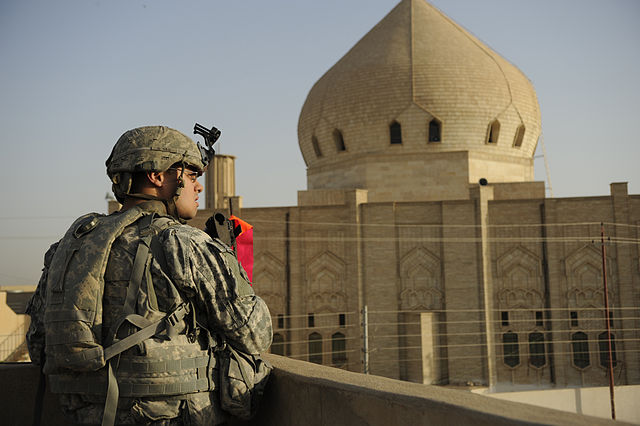
I almost missed this story, but it’s a big one: ISIS has been vanquished and driven out of the Iraqi city of Mosul, its capitol and the biggest city it had ruled, by an Iraqi-American coalition assault:
Flanked by Iraqi forces of all stripes, Prime Minister Haider al-Abadi declared Mosul has been recaptured from ISIS.
“From here, from the heart of the liberated and free Mosul, by the sacrifices of the Iraqis from all the provinces, we declare the great victory for all of Iraq and Iraqis,” al-Abadi announced Monday.
There are very few problems in the world that can be solved by military force; this is one of the few that can. ISIS’ goal wasn’t just to commit terrorist attacks, but to carve out a theocratic state where their bloody interpretation of Islam would reign. They can’t achieve that aim unless they exert control over a territory. And for the past three years, they did just that, ruling over Mosul and surrounding regions with horrendous brutality. Against such savage violence, peaceful resistance can’t hope to succeed, and force of arms is the only hope.
The battle to oust ISIS from Mosul took nine months of street-by-street, house-by-house urban warfare. But this is more than just a military defeat for them. It’s a major symbolic blow. Mosul was their birthplace: its al-Nuri Mosque compound was where Abu Bakr al-Baghdadi declared the existence of their caliphate in July 2014.
Just a few months later, they were approaching the outskirts of Baghdad, and Iraqi soldiers were throwing down their weapons and fleeing. They spread so far and so fast as to seem unstoppable, and it’s possible that their success caused some wavering Muslims to wonder if God wasn’t on their side after all.
This defeat shatters their reputation for invincibility. Now that they’re broken and on the run, it’s impossible for any Muslim (or anyone else) to believe that God is on their side and assuring their victory. While they still hold some smaller towns, their only other stronghold is the Syrian city of Raqqa, and that too is coming under assault.
It’s a serious blow to their self-image as well, given what I’ve written about ISIS’ apocalyptic theology. Since the beginning, they’ve seen themselves as God’s chosen army in the end times. But this defeat wasn’t supposed to happen – there’s no way it fits into their plan. It’s bound to cause dissension within their own ranks.
After all, throughout the history of religion, swift conquest has always been brandished as a sign of divine favor, from the Hebrews’ invasion of the promised land to the medieval Crusades to Mohammed himself at the founding of Islam. For an army that believes this, any defeat is bound to undermine their faith and weaken their cohesion as a fighting force. It’s a dramatic case of my principle that the only fatal mistake in religion is making a claim that can be disproved by evidence.
That said, I have no doubt some extremist theologian will soon come up with an explanation for why God allowed ISIS to be vanquished: their hearts weren’t pure enough, they didn’t slaughter nonbelievers ruthlessly enough, that sort of thing. It always happens. Even so, this defeat has been cutting into their recruiting:
The tidal wave of tens of thousands of “foreign fighters” that once flocked from around the Muslim world and beyond to ISIS’ black banners has slowed to a trickle. Estimates cited by The Washington Post suggest that the flow of foreign recruits to ISIS had dropped from a high of 2,000 a month to 50 a month by last fall.
Few foreign militants want to join the losing team.
Unfortunately, even this is unlikely to put a permanent end to ISIS. If they lose all their strongholds, they’ll probably just revert to a typical religious-fundamentalist insurgency, waging random and opportunistic terror attacks wherever they can. The Middle East will be dealing with their chaos for the foreseeable future, as will Europe and the U.S.
And the states that will reexert control where ISIS has fled are hardly secular paradises themselves. If they fail to govern responsibly, similar terrorist groups may arise in the future, like fungus growing in the dark. We can’t forget that Mosul is still in ruins, with no water or electricity, and thousands of people displaced and orphaned by war. Its rebuilding will be a colossal task.
Even so, we can welcome this as the first and most basic step toward the return of democratic self-governance and allowing the Iraqi people to decide their own future. No nation can have the hope of a better life for its people while the knife of fundamentalist tyranny is at its throat. If the defeat of ISIS doesn’t represent progress, it’s at least the precondition for all future progress to be made.
Image credit: The U.S. Army, public domain, via Flickr